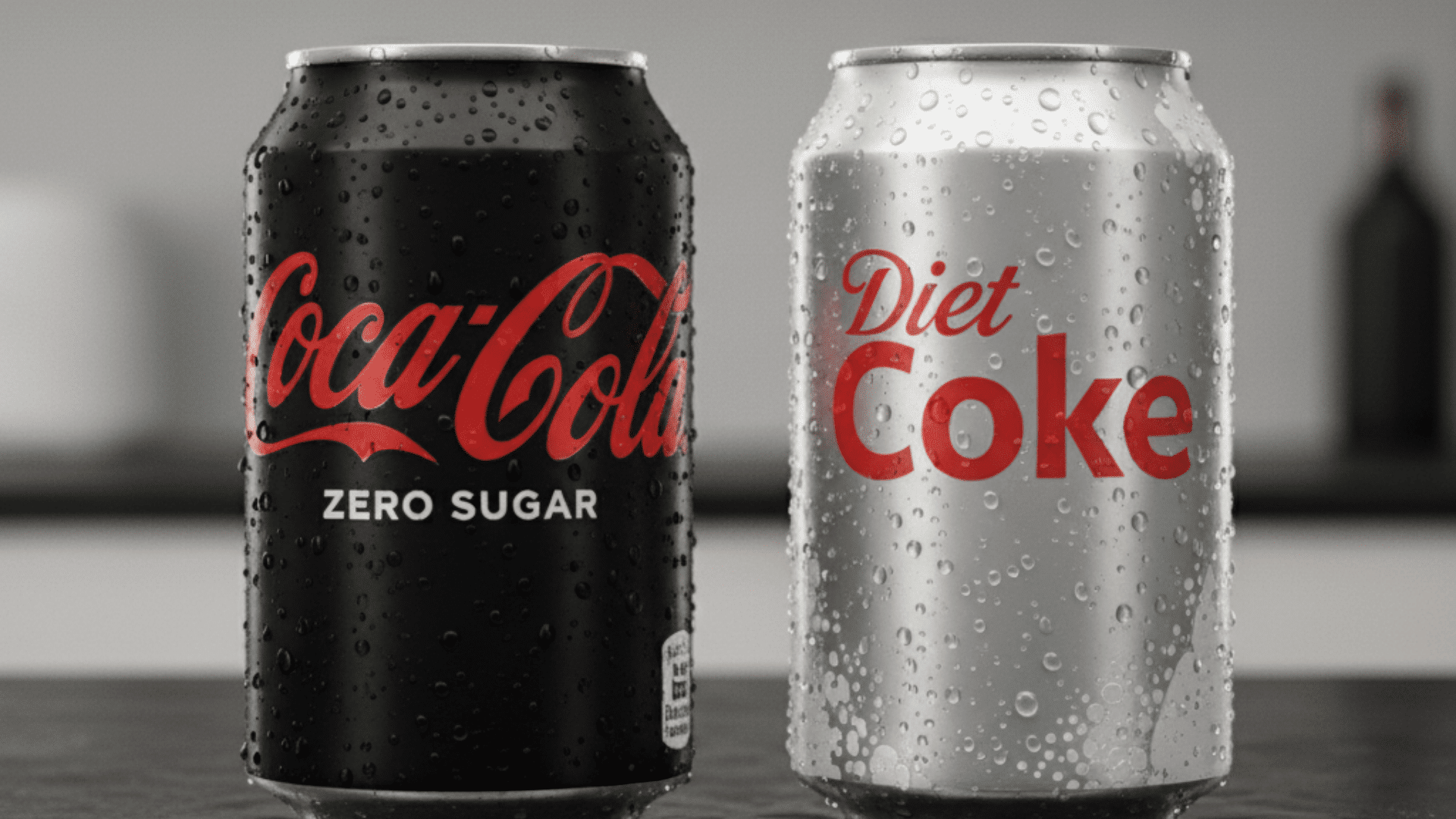Walk down any soda aisle today and you’ll notice something: “diet” labels are disappearing, replaced by “zero sugar” branding everywhere.
But are these just marketing makeovers, or do the drinks actually differ? The truth involves more than rebranding.
It’s about taste engineering, sweetener blends, and shifting consumer preferences.
While both types eliminate sugar and calories, the formulations, flavor profiles, and health considerations vary in ways that affect your drinking experience.
What “Diet” vs “Zero Sugar” Really Means
Both diet and zero-sugar sodas are sugar-free carbonated drinks sweetened with low or zero-calorie alternatives to keep calories near zero.
The fundamental difference lies in their positioning and taste targets.
“Zero sugar” products are typically engineered to mimic the taste of regular full-sugar sodas as closely as possible.
Companies invest heavily in sweetener blends and flavor adjustments to recreate that familiar taste profile.
“Diet” sodas, by contrast, often maintain their own distinct flavor identity; that characteristic “diet” taste that some people prefer and others avoid.
Key Differences Between Diet and Zero Sugar Sodas

While both eliminate sugar and calories, the distinctions lie in their formulations, taste engineering, and market positioning. Understanding these differences helps explain why your taste buds might prefer one over the other.
1. Ingredients and Sweeteners Across the Category
The sweetener landscape includes several key players: aspartame, acesulfame potassium (Ace-K), sucralose, and saccharin.
These are often blended in different ratios to balance sweetness levels and minimize aftertaste.
Zero sugar formulations frequently use combinations like aspartame plus Ace-K, or sucralose with Ace-K. Diet versions might stick to single sweeteners or legacy formulas that have remained unchanged for decades.
Both types include acidulants like phosphoric or citric acid to provide that tangy bite.
While formulas vary by brand and region, the sugar content remains effectively zero in both styles, with calories staying minimal across the board.
2. Taste: What Your Palate Actually Notices
Zero sugar lines target a closer-to-original cola, lemon-lime, or root beer taste through careful sweetener selection and flavor tweaking.
The goal is to reduce the gap between regular and sugar-free versions.
Diet versions often taste lighter or distinctly different from their regular counterparts. Some consumers prefer this unique profile, while others find zero sugar versions deliver the taste they expect from their favorite soda.
Personal preference plays a significant role here; neither approach is objectively better.
3. Branding: Why “Zero Sugar” Dominates Shelves
Beverage companies have systematically rebranded diet products to zero sugar to match consumer preferences, particularly among younger shoppers who associate “diet” with outdated weight-loss culture.
Examples include Diet Snapple becoming Snapple Zero Sugar and similar transitions across major brands.
This shift represents market positioning rather than fundamental formula changes in many cases.
The “zero sugar” terminology tests better with focus groups and aligns with current health messaging that emphasizes reducing added sugars rather than dieting.
Health Considerations: Which Option Is Better?

Both diet and zero-sugar sodas help reduce added sugar and calorie intake compared to regular sodas. The health picture involves several factors beyond just sugar elimination.
1. Sweetener Safety
Recent evaluations by health organizations provide current guidance on artificial sweeteners. The International Agency for Research on Cancer (IARC) classifies aspartame as “possibly carcinogenic” (Group 2B) based on limited evidence.
However, the WHO/FAO Joint Expert Committee on Food Additives (JECFA) reaffirmed the acceptable daily intake of 0-40 mg/kg body weight per day, indicating safety within established limits.
For most people consuming normal amounts, current safety guidelines suggest these sweeteners remain within acceptable ranges.
2. Dental Health
Even sugar-free sodas present dental considerations. Both diet and zero-sugar varieties are acidic and can contribute to enamel erosion with frequent exposure.
The Australian Dental Association recommends limiting frequency, consuming acidic beverages with meals when possible, and rinsing with water afterward to reduce contact time with teeth.
3. Caffeine Content
Caffeine levels vary by flavor and brand rather than by diet versus zero sugar designation.
If you’re sensitive to caffeine, checking labels becomes important regardless of which type you choose.
Is Zero Sugar Soda Bad for You?

Zero-sugar sodas aren’t inherently harmful when consumed in moderation. They successfully reduce added sugar intake, a positive dietary change for most people.
The main considerations involve sweetener tolerance, dental enamel exposure to acids, and caffeine sensitivity.
Current global safety bodies maintain established acceptable daily intake levels for common sweeteners.
Practical guidance suggests prioritizing water as your primary beverage, limiting soda frequency, and treating sugar-free sodas as occasional choices rather than daily staples.
How to Choose Between Diet and Zero Sugar
Your decision can depend on several practical factors
- Taste preference: If you want something closer to regular soda flavor, try zero-sugar versions first. They’re engineered to bridge that gap more effectively.
- Dental health concerns: Limit frequency regardless of type, consume with meals when possible, and rinse with water afterward to minimize acid contact.
- Sweetener sensitivities: Check ingredient lists since formulations differ. People with phenylketonuria (PKU) must avoid aspartame entirely, making sucralose-based options necessary.
Quick Comparison
| Feature | Diet Soda | Zero Sugar Soda |
|---|---|---|
| Calories/Sugar | ~0 kcal, 0g sugar | ~0 kcal, 0g sugar |
| Sweeteners | Often single sweetener or legacy formula | Often blends (aspartame + Ace-K, etc.) |
| Flavor Target | Distinct “diet” taste profile | Closer to regular soda taste |
| Branding | Legacy term, skews older demographics | Newer term, broader appeal |
Note: Exact sweeteners and caffeine content vary by brand and region; always check labels for specific information.
Bottom Line
The diet versus zero sugar distinction often comes down to taste preference and marketing positioning rather than significant health differences.
Zero sugar versions generally aim for a closer-to-original taste through more complex sweetener blends, while diet versions maintain their established flavor profiles.
Your best choice depends on taste preferences, any sweetener sensitivities, and how the beverages fit into your overall dietary pattern.
Neither represents a health drink, but both serve as reasonable occasional alternatives to full-sugar sodas when you want something fizzy and flavorful.
What factors matter most in your soda choice: taste similarity to regular versions, specific sweetener preferences, or other health considerations? Share your experience with diet versus zero sugar options in the comments below.













